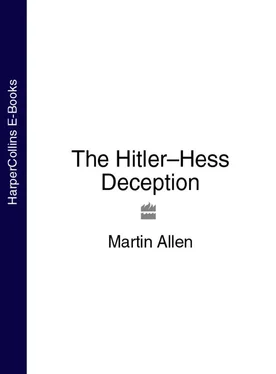The message concluded:
It is not for H.M.G. to say how these conditions could be met, but they are bound to say that, in their view, they are essential to the establishment of confidence on which alone peace could be solidly and durably based …
Neither France nor Great Britain, as the Prime Minster said, have any desire to carry on a vindictive war, but they are determined to prevent Germany continuing to make life in Europe unbearable. 26
On receiving the bulk of this communication via Stevens, Schellenberg promptly reported to Heydrich: ‘The British officers [have] declared that His Majesty’s Government took great interest in our attempt which would contribute powerfully to prevent the spread of war … They assured us that they were in direct contact with the [British] Foreign Office and Downing Street.’ 27He concluded by informing Heydrich that the British had invited him to secret peace negotiations in London, and that Stevens had even given him a transmitter (call sign ON4) with which he could covertly contact the British directly.
Heydrich’s response was most interesting, indicating that there was a great deal more going on behind the scenes than Schellenberg ever knew about. ‘All this seems to me a little too good to be true,’ the head of the SD commented. ‘I find it hard to believe that it’s not a trap. Be very careful going to London. Before making a decision I shall have to talk not only with the Reichsführer [Himmler] but more particularly with the Führer. Wait for my orders before proceeding.’ 28Evidently from the German side the negotiations emanated from the pinnacle of Nazi government.
Events, however, were about to take a bizarre and unexpected twist. In distant Munich, on the night of Wednesday, 8 November, there was an attempt on Hitler’s life when a bomb blew up the Bürgerbräukeller just twenty minutes after he had cut short a speech and unexpectedly departed early. Outraged that this assassination attempt might have been prompted by the British, the SD took immediate action.
The very next afternoon, Stevens and Payne-Best, who were waiting to meet Schellenberg at the little Dutch–German frontier post at Venlo, were kidnapped by SD agents who dashed across the border, shot up the Dutch customs post, grabbed the two startled British Intelligence officers and made off with them across the frontier into Germany. Stevens and Payne-Best were intensively interrogated by German Intelligence, and after the German conquest of the west in 1940 the whole of Britain’s secret service network in western Europe would be brought crashing down, leaving it with virtually no intelligence-gathering assets. On the German side, the Venlo Incident, as it became known, ended any possibility of Schellenberg negotiating an end to the war.
As far as the British were concerned, this had been a true peace negotiation. The fact that Britain’s participants in the secret discussions were headed by Lord Halifax and Neville Chamberlain reveals the seriousness with which they were regarded by the British side, for Chamberlain was still keen to restore European peace. The Prime Minister was motivated by the desire to restore his reputation, but wanted to keep his failure hidden if he did not.
Although Halifax and Chamberlain had thought they could still negotiate an end to the conflict, the manner of the Venlo snatch by the SD finally impressed upon London that the Nazis were beyond the pale. How could Britain engage in meaningful peace negotiations with the Nazis when they reacted to an internal security problem by kidnapping peace negotiators?
When Winston Churchill discovered the truth behind the incident shortly after Stevens and Payne-Best’s kidnapping, his fury knew no bounds. Not only had Halifax and Chamberlain secretly engaged in a dangerous peace initiative, they had done so behind the back of the Cabinet. In Churchill’s eyes the appeasement of Nazism had led to the obliteration of the Czech state, the invasion of Poland, and to Britain and France facing a war just as they had in 1914. Yet Chamberlain had apparently not learned the lessons of appeasement, and had attempted mediation again. This was bad enough, but what Churchill also realised – which had apparently escaped Chamberlain – was that Chamberlain had unwittingly placed the alliance itself in dire peril. If the Germans were to leak details of the negotiations to the French, it would utterly shatter France’s confidence in Britain’s resolve to stand firm, ensuring victory to the Germans.
That German Intelligence did not leak the Venlo details to the French, however, is a clear indication that they too had much to hide, for it was no part of Hitler’s plans for the German Volk to hear that top Nazis were attempting secretly to negotiate peace with Britain until it was a done deal.
The Venlo Incident was not a clear-cut peace negotiation, for much double-dealing occurred behind the scenes, primarily organised by those masters of Machiavellian deceit, Reinhard Heydrich and Heinrich Himmler. To call it instead an ‘SS peace move’ might be more accurate. But Venlo was important because it involved Britons and Germans at the highest level; it also set in motion a chain of events that would give the first seeds of an idea to British Intelligence that they might conduct a similar ‘sting’ of their own.
It is entirely possible that the Stevens/Payne-Best–Morz operation pre-October 1939 was originally an SD ‘sting’ aimed at crippling British Intelligence’s network in western Europe, but Heydrich’s participation in the operation post-Dahlerus indicates that a change in priorities had taken place. Moreover, Schellenberg’s reports on the affair were passed through Heydrich directly to Himmler.
On the British side, much of the remaining evidence suggests that the subsequent writing-off of Venlo as a ‘sting’ was primarily intended to protect Chamberlain from being caught holding secret peace talks with the Germans at the same time that he was condemning Nazi expansionism – a position he would have found hard to explain not only to Parliament, but to the Poles and the French. Intriguingly, in the Foreign Office’s ‘President Roosevelt’s Eyes Only’ communication of June 1941, Sir Alexander Cadogan would confidentially remark to Britain’s Ambassador in Washington that ‘the only important omission from our memorandum is the story of the Venlo incident in November 1939’. 29Thus, within Whitehall, Venlo was classified as amongst the ‘peaceable attempts’, and not as an intelligence operation that went disastrously wrong.
Given what is known about Hitler’s desperation to end the war with Britain, it is possible that had the SS found a possible route to peace, Himmler would have ordered Heydrich to explore it, for he too was well aware of the extremely dangerous situation Germany was falling into. In 1942 Count Ciano would record that ‘Himmler, who now feels the real pulse of the country, wants a compromise peace’, 30for his ‘plans for expansion into Russia were based on his hopes of coming to an understanding with the West’. 31Indeed, when the tide of war had finally turned inexorably against Germany in 1944, Himmler would earnestly engage in his own secret peace negotiations, this time without Hitler’s knowledge, and would attempt to use Albrecht Haushofer to do this. It is therefore likely that Himmler was inclined to attempt to restore peace with Britain in 1939, at a time when it would have secured both the fortunes of the Reich and his own position at the top of the Nazi hierarchy.
The collapse of the Venlo/SS peace attempt unnerved Hitler, for he undoubtedly did believe that the Bürgerbräukeller attempt on his life had been connected in some way to the negotiations taking place in Holland. But unbeknownst to Himmler, Heydrich or anyone else in the SS, Hitler was already pursuing yet another entirely private avenue to peace – his own short-cut to European domination. Hitler was a great believer in auguries, mysticism, and what he liked to call his ‘destiny’. It is therefore little wonder that he took his salvation from the Bürgerbräukeller bombing very seriously indeed, and was sure fate had played a hand in saving him from being blown to bits. The reason Hitler had left the Bürgerbräukeller early was to travel back to Berlin to meet another emissary. Only this emissary wasn’t offering peace mediation, but a victory that would enable him to dictate peace terms to a defeated foe.
Читать дальше












